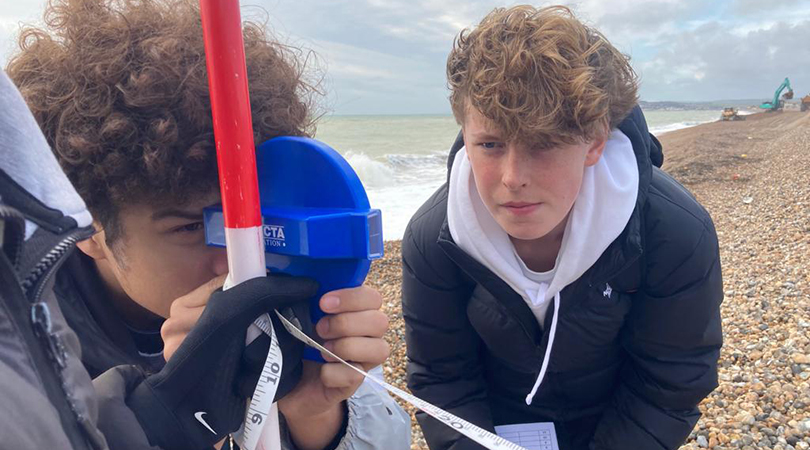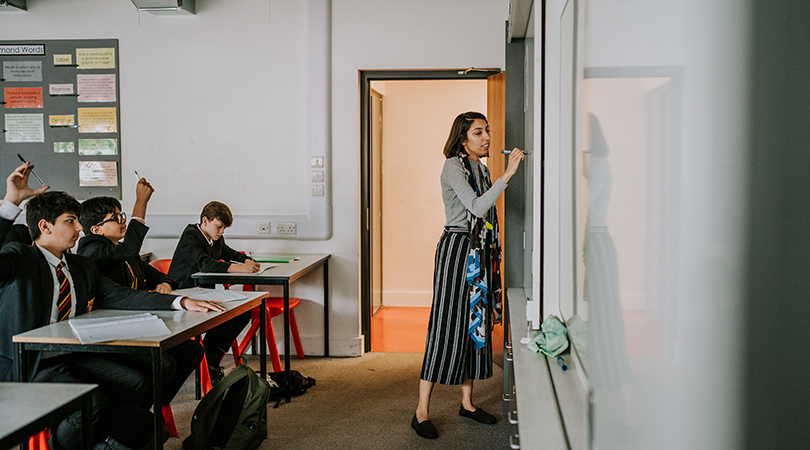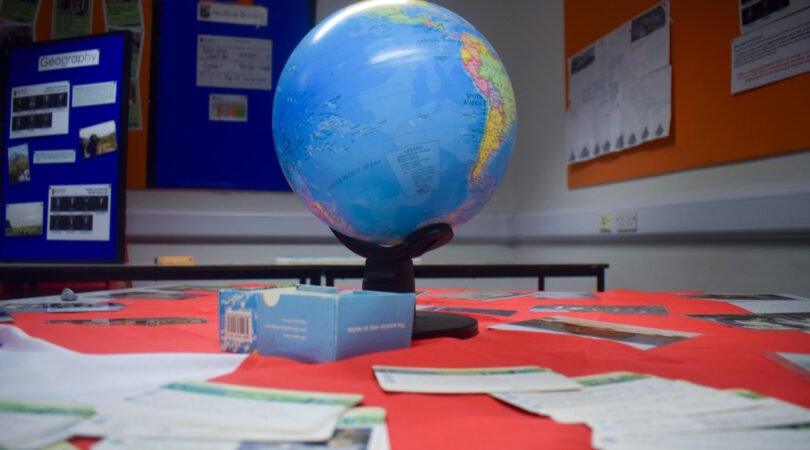Geography is not only up-to-date and relevant, it is one of the most exciting, adventurous and valuable subjects to study today. So many of the world’s current problems boil down to geography and need the geographers of the future to help us understand them.
Summary
Curriculum Content
Introduction to Geography & the UK
Introduction to key geographical skills and critical geographical knowledge needed for geography at Isleworth & Syon. Including a focus on the landscape and weather of the UK.
Introduction to Geography & the UK Landscape
Introduction to key geographical skills and critical geographical knowledge needed for geography at Isleworth & Syon. Including a focus on the landscape and weather of the UK.
Rivers
This unit focuses on physical geography and considers the processes that form and change rivers overtime.
Changing Cities – London
This unit focuses on London and explores the human geography of our Capital city. Students use the skills from this unit to explore another megacity of their choice.
Ecosystems – The Tropical Rainforest
This unit focuses on the interrelationships between human and physical geography. It considers the importance of Tropical rainforests on the world and future ways to manage and protect them.
My City – Human Fieldwork
Students investigate place-specific geography designed to develop fieldwork skills and widen their awareness of place and space.
Throughout the Year 7 geography course, students will study ‘global challenges’. This introduces contemporary topics to their studies for example The Middle East, Russia, Asia and Polar environments. Global challenges are standalone decision-making exercises designed to expose student to a variety of topics based on current affairs and support them to make critical informed arguments on issues facing our world today.
Assessment
Knowledge, Explanation, Geographical skill & Case studies
In every unit, students will be assessed on these 4 categories. All assessments are designed to support learners on a linear journey towards GCSE. Crucially developing transferable skills. Students will complete a mid-unit assessment focused on two of the four elements and an end of unit assessment which will review the other two elements.
Progress & Preparation Activities (PPA)
PPA sheets will be provided to students each week and focus on developing comprehension skills and widening learners’ geographical knowledge.
Further Resources
The school has a subscription to The Day, an online news service for schools. Click the button to the right, then browse ‘Subjects’ in the top menu to find geography resources.
Please see below for a number of resources to maximise students’ progress during their Year 7 curriculum.
- S-Cool – an excellent revision website.
- Geographical Association – contains numerous important and interesting study resources.
- Google Earth – learn about the world around you with this interactive tool from Google.
- Flash Earth – zoom and view any area of the world.
Curriculum
Coasts
This unit is an exploration of the physical geography along UK coastlines. Focusing on erosion and the physical features created as a result.
Global Development
Through this unit, focuses on the current global populations and the demographic changes taking place. It also considers the distribution of wealth globally, one of the most contemporary issues facing society at present.
Climatic Hazards
This unit studies the cause, impact and management of climatic hazards globally. Student will have a chance to act as management response agents and explore real time decisions to reduce impact and save lives after tropical storms.
Resource Management
This unit explores the key issues facing unequal distribution of resources globally. Students will consider how sustainability and consumer conscientiousness impacts todays trade and global markets.
Ecosystems – Deciduous Woodlands
Students investigate the global atmospehric model and the role of the oceans in heat transfer. They will also consider the role of vegetation in managing climate and the impacts on different environments, focusing first on the UK’s primary biome.
Assessment
Knowledge, Explanation, Geographical skill & Case studies
In every unit, students will be assessed on these 4 categories. All assessments are designed to support learners on a linear journey towards GCSE. Crucially developing transferable skills. Students will complete a mid-unit assessment focused on two of the four elements and an end of unit assessment which will review the other two elements.
Progress & Preparation Activities (PPA)
PPA sheets will be provided to students each week and focus on developing comprehension skills and widening learners’ geographical knowledge.
Further Resources
The school has a subscription to The Day, an online news service for schools. Click the button to the right, then browse ‘Subjects’ in the top menu to find geography resources.
Please see below for a number of resources to maximise students’ progress during their Year 8 curriculum.
- S-Cool – an excellent revision website.
- Geographical Association – contains numerous important and interesting study resources.
- Google Earth – learn about the world around you with this interactive tool from Google.
- Flash Earth – zoom and view any area of the world.
Curriculum
Changing World
This unit looks at climate change and the impact that this is having on our society and the environment. The focus is on future events and what should be done now.
Life on the Edge
This unit looks at the different biomes around the world and the future pressures on them; including the potential impacts of continued human development and climate change.
Aid and development
This is the examination of charity and aid around the world, considering who receives it and the implications that aid has on those communities. The students will develop greater social awareness of cultures and needs globally.
Hazardous World – Climatic Hazards
This unit studies the cause, impact and management of climatic hazards globally.
My London – Human & Physical fieldwork
This unit investigates the local area using human and physical fieldwork skills. It builds on the techniques used in Years 7 & 8 to create a comprehensive view of the local area.
Assessment
Knowledge, Explanation, Geographical skill & Case studies
In every unit, students will be assessed on these 4 categories. All assessments are designed to support learners on a linear journey towards GCSE. Crucially developing transferable skills. Students will complete a mid-unit assessment focused on two of the four elements and an end of unit assessment which will review the other two elements.
Progress & Preparation Activities (PPA)
PPA sheets will be provided to students each week and focus on developing comprehension skills and widening learners’ geographical knowledge.
Further Resources
The school has a subscription to The Day, an online news service for schools. Click the button to the right, then browse ‘Subjects’ in the top menu to find geography resources.
Please see below for a number of resources to maximise students’ progress during their Year 9 curriculum.
- S-Cool – an excellent revision website.
- Geographical Association – contains numerous important and interesting study resources.
- Google Earth – learn about the world around you with this interactive tool from Google.
- Flash Earth – zoom and view any area of the world.
Summary
GCSE Geography
Level: GCSE
Examination Board: Edexcel
Curriculum
Topic 1: The Changing Landscapes of the UK
An overview of the distribution and characteristics of the UK’s changing landscapes and detailed studies of two landscapes:
- 1A: Coastal landscapes and processes
- 1B: River landscapes and processes
Topic 2: Weather Hazards and Climate Change
An overview of the global circulation of atmosphere and climate change over time and two detailed studies of tropical cyclones and drought.
Topic 3: Ecosystems, Biodiversity and Management
An overview of the distribution and characteristics of global and UK ecosystems and two detailed studies of deciduous woodlands and tropical rainforests.
Topic 4: Changing Cities
This covers an overview of global urban processes and trends and detailed case studies of a major UK city and a major city in a developing or emerging country.
Topic 5: Global Development
This covers an overview of the causes and consequences of uneven global development and detailed case studies of challenges that affect a developing or emerging country.
Topic 6: Resource Management
This covers an overview of the global and UK distribution of food, energy and water and one detailed study of energy resource management at different scales.
Topic 7: Geographical Investigations – Fieldwork.
Two geographical investigations each involving fieldwork and research:
- 7A: Investigating physical environments (coasts)
- 7B: Investigating human landscapes (central/inner urban area)
Topic 8: Geographical Investigations – UK Challenges
Students are required to draw across their knowledge and understanding of the UK, from the physical and human geography drawn from Topics 1-6 in order to investigate a contemporary challenge for the UK. Students are required to have a geographical overview of the four UK challenges in Topic 8 from which the assessment context will be drawn.
Assessment
Paper 1 – The Physical Environment
Written examination – 1 hour 30 minutes (94 marks) – 37.5% of GCSE grade
Paper 2 – The Human Environment
Written examination – 1 hour 30 minutes (94 marks) – 37.5% of GCSE grade
Paper 3 – Geographical investigations
Written examination (fieldwork & decision exercise) – 1 hour 30 minutes (64 marks) – 25% of GCSE grade
Further Resources
The school has a subscription to The Day, an online news service for schools. Click the button to the right, then browse ‘Subjects’ in the top menu to find geography resources.
Please see below for a number of resources to maximise students’ progress during their Year 10 curriculum.
- BBC Bitesize: GCSE Geography – excellent revision resources from the BBC.
- Geographical Association – contains numerous important and interesting study resources.
- Edexcel – examination board website, to access past papers, mark schemes and specifications.
Summary
A level Geography
Level: A level
Examination Board: Edexcel
Curriculum
Topic 1 – Tectonic Processes & Hazards
Tectonic hazards – earthquakes, volcanic eruptions and secondary hazards such as tsunamis – represent a significant risk in some parts of the world. This is especially the case where active tectonic plate boundaries interact with areas of high population density and low levels of development. Resilience in these places can be low, and the interaction of physical systems with vulnerable populations can result in major disasters. An in-depth understanding of the causes of tectonic hazards is key to both increasing the degree to which they can be managed, and putting in place successful responses that can mitigate social and economic impacts and allow humans to adapt to hazard occurrence.
Topic 2 – Coastal Landscapes and Change
Coastal landscapes develop due to the interaction of winds, waves and currents, as well as through the contribution of both terrestrial and offshore sources of sediment. These flows of energy and variations in sediment budgets interact with the prevailing geological and lithological characteristics of the coast to operate as coastal systems and produce distinctive coastal landscapes, including those in rocky, sandy and estuarine coastlines. These landscapes are increasingly threatened from physical processes and human activities, and there is a need for holistic and sustainable management of these areas in all the world’s coasts. Study must include examples of landscapes from inside and outside the UK.
Topic 3: Globalisation
Globalisation and global interdependence continue to accelerate, resulting in changing opportunities for businesses and people. Inequalities are caused within and between countries as shifts in patterns of wealth occur. Cultural impacts on the identity of communities increase as flows of ideas, people and goods take place. Recognising that both tensions in communities and pressures on environments are likely, will help players implement sustainable solutions.
Topic 2: Coastal Landscapes and Change
Coastal landscapes develop due to the interaction of winds, waves and currents, as well as through the contribution of both terrestrial and offshore sources of sediment. These flows of energy and variations in sediment budgets interact with the prevailing geological and lithological characteristics of the coast to operate as coastal systems and produce distinctive coastal landscapes, including those in rocky, sandy and estuarine coastlines. These landscapes are increasingly threatened from physical processes and human activities, and there is a need for holistic and sustainable management of these areas in all the world’s coasts. Study must include examples of landscapes from inside and outside the UK.
Topic 4: Shaping Places, Regenerating Places
Local places vary economically and socially with change driven by local, national and global processes. These processes include movements of people, capital, information and resources, making some places economically dynamic while other places appear to be marginalised. This creates and exacerbates considerable economic and social inequalities both between and within local areas. Urban and rural regeneration programmes involving a range of players involve both place making (regeneration) and place marketing (rebranding). Regeneration programmes impact variably on people both in terms of their lived experience of change and their perception and attachment to places. The relative success of regeneration and rebranding for individuals and groups depends on the extent to which lived experience, perceptions, and attachments to places are changed.
Topic 5: The Water Cycle and Water Insecurity
Water plays a key role in supporting life on earth. The water cycle operates at a variety of spatial scales and also at short- and long-term timescales, from global to local. Physical processes control the circulation of water between the stores on land, in the oceans, in the cryosphere, and the atmosphere. Changes to the most important stores of water are a result of both physical and human processes.
Topic 6 – The Carbon Cycle and Energy Security
A balanced carbon cycle is important in maintaining planetary health. The carbon cycle operates at a range of spatial scales and timescales, from seconds to millions of years. Physical processes control the movement of carbon between stores on land, the oceans and the atmosphere. Changes to the most important stores of carbon and carbon fluxes are a result of physical and human processes. Reliance on fossil fuels has caused significant changes to carbon stores and contributed to climate change resulting from anthropogenic carbon emissions. The water and carbon cycles and the role of feedbacks in and between the two cycles, provide a context for developing an understanding of climate change. Anthropogenic climate change poses a serious threat to the health of the planet. There is a range of adaptation and mitigation strategies that could be used, but for them to be successful they require global agreements as well as national actions.
Topic 7 – Superpowers
Superpowers can be developed by a number of characteristics. The pattern of dominance has changed over time. Superpowers and emerging superpowers have a very significant impact on the global economy, global politics and the environment. The spheres of influence between these powers are frequently contested, resulting in geopolitical implications.
Topic 7 – Superpowers
Superpowers can be developed by a number of characteristics. The pattern of dominance has changed over time. Superpowers and emerging superpowers have a very significant impact on the global economy, global politics and the environment. The spheres of influence between these powers are frequently contested, resulting in geopolitical implications.
Topic 8 – Global Development and Connections
Choice of either ‘Health, Human Rights and Intervention’ or ‘Migration, Identity and Sovereignty’.
Coursework – Independent Investigations
The purpose of this coursework is to test students’ skills in independent investigation. Students are required to undertake an independent investigation that involves (but which need not be restricted to) fieldwork. The focus of the investigation must be derived from the specification the student is studying. The guidance for word length is 3000-4000 words. The student defines a question or issue relating to the compulsory or optional content. The student’s investigation will incorporate fieldwork data (collected individually or as part of a group) and own research and/or secondary data. The student’s report will evidence independent analysis and evaluation of data, presentation of data findings and extended writing.
Assessment
Paper 1
Written examination – 2 hours 15 minutes (105 marks) – 30% of A level
Paper 2
Written examination – 2 hours 15 minutes (105 marks) – 30% of A level
Paper 3
Written examination – 2 hours 15 minutes (105 marks) – 20% of A level
Coursework: Independent investigation
Non-examined assessment (70 marks) – 20% of A level
Further Resources
The school has a subscription to The Day, an online news service for schools. Click the button to the right, then browse ‘Subjects’ in the top menu to find geography resources.
Please see below for a number of resources to maximise students’ progress during their Year 12 curriculum.
- ALC Geog A level Blog – A level support and revision materials.
- Edexcel – A level specification.
- ‘WE Act’ group – Charity group working within school to raise awareness of global issues and support local charities. The ‘WE Act’ group meet each week to organise events.
- Fieldtrips – students undertake fieldwork in a variety of locations including on site work, local area studies and visits to Seaford, Cardiff and central London.




